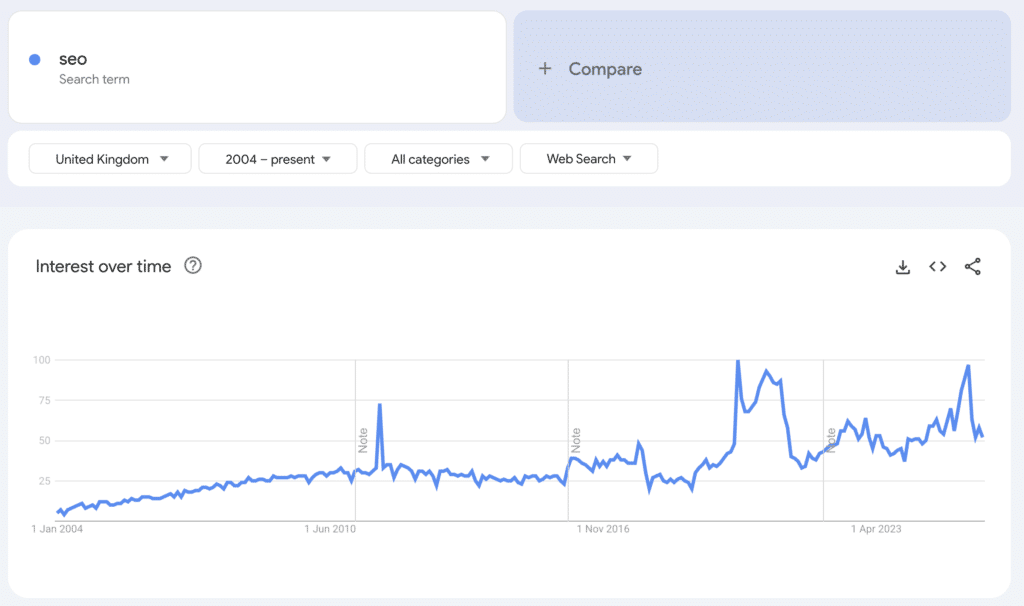If you run a business in 2025, SEO is still one of the most effective ways to connect with people when they are actively searching for what you offer.
Search has changed with AI and evolving Google updates, but the fundamentals of visibility, trust, and discoverability remain the same. Whether you are a local service or a global ecommerce brand, SEO makes sure your business is found at the right moment.
A brief history of ‘SEO is dead’ cycles
People have been asking this question for over a decade. Each time Google releases a major update, headlines declare ‘SEO is dead.’ But what really happens is adaptation.
To understand where we are, it helps to look back. Over the years, every major Google update has triggered whispers that ‘SEO is over’ and yet, SEO adapts.
- 2011 / 12 Panda / Penguin updates: when Google cracked down on thin content and manipulative links, many sites collapsed. But the survivors were those that offered genuine value
- 2013 Hummingbird update: this 2013 update shifted Google towards natural language and semantic intent, nudging SEO away from keyword stuffing
- 2015 Mobilegeddon: in 2015, Google announced they’d favour mobile-friendly sites, and many panicked. Some sites lost visibility, but responsive design became the standard
- 2022-25 Helpful content / core updates: more recent updates reward original, high-quality content over churned, superficial pages
Number of searches: Google vs ChatGPT
To understand how much opportunity there still is in SEO, it helps to compare how much people use search engines vs AI tools, such as ChatGPT:
- Google processes around 16.4 billion searches per day, which amounts to about 189,800 searches per second. More conservative estimates (based on Google’s own statements) put daily search volume closer to 14 billion searches per day, or over 5 trillion per year
- In contrast, ChatGPT sees about 2.5 billion prompts per day (as of mid-2025)
- Historical estimates from 2024 say ChatGPT had ~ 37.5 million ‘search-like’ prompts per day, giving it only ~0.25 % of search share compared to Google. In fact, in 2024 Google got ~373× as many searches as ChatGPT
These numbers show that although AI usage is growing fast, Google search traffic still dwarfs ChatGPT in sheer volume.
For a business, that means the lion’s share of user intent still plays out in search results. That’s your opportunity.
Will SEO jobs be replaced by AI?
A deeper concern for some and a question many will be asking in the industry and looking to take their first steps into a career in SEO.
AI tools can already draft content, analyse traffic and support audits. But there are limits.
Where AI helps:
- Speeding up keyword research
- Identifying technical issues
- Creating content outlines or first drafts
Where humans remain essential:
- Aligning SEO with brand strategy
- Making ethical and sustainable choices
- Understanding cultural context and nuance
- Building trust and relationships
- Embedding environment and people first thinking
AI will change how SEO professionals work, but will not erase the need for them. The most valuable roles will focus on strategy, creativity and purpose.
Search Engine Land agrees that while AI search is booming, SEO fundamentals are still critical and that SEO will simply adapt rather than become extinct.
In short: jobs may change, tools may change, but the need for human insight remains.

Why SEO is as important as ever
SEO in 2025 is less about outsmarting algorithms and more about aligning with people’s needs. As AI changes search, a few things stand out:
- Trust and expertise are becoming stronger ranking factors
- User experience matters more, from site speed to accessibility
- Helpful content is rewarded while superficial content is penalised
- Values and purpose give businesses an edge in crowded markets
A people-first and environment-aware approach to SEO is not just good ethics, it’s good strategy. Optimisation today means creating content that helps communities, supports sustainable growth and prioritises long-term relationships over short-term wins.
SEO is evolving, not disappearing
SEO is not dead. It is not being replaced by AI. It is adapting – just as it always has.
With Google still receiving billions of searches a day, your customers are out there looking. The question isn’t ‘do I need SEO?’, it’s ‘how do I do SEO well in 2025?’.
If you are asking ‘do I need SEO, as a business?’ The answer is yes. But it is not enough to optimise for algorithms. The future of SEO belongs to businesses that optimise for people and the planet, building trust, visibility and sustainable growth in the process.








